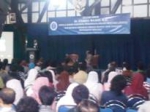ITB Studium Generale: Downstream Research Effort in the Maritime Industry, Transportation, and Military Sector
By Adi Permana
Editor Adi Permana

BANDUNG, itb.ac.id – Institut Teknologi Bandung (ITB) held another Public Lecture Studium Generale, KU-4078 on Wednesday (2/2/2022). Today's topic is the Downstream Research of Maritime, Transportation, and Defense Industry. This public lecture presented Dr. Ir. Wahyu Widodo Pandoe, M.Sc., IPU, Principal Engineer, as the main speaker.
Wahyu Widodo is an ITB alumnus from the Geodesy Engineering study program class of 1985, he also held a position as the Deputy for Industrial Technology, Design, and Engineering, BPPT, from 2017 to 2021. Dr. Wahyu specializes in the industrial downstream process.
The downstream effort is a process of bringing innovation and research results closer to its down user. The 'down user' term itself refers to the general public or interested institutions.
Wahyu explained that this downstream process is vital in promoting domestic innovations. Because of its economic potential, the government needs to take an active role in supporting this process. Some of the strategic aspects in ensuring the success of this downstream process are the implementation of new technologies as a means of achieving sustainable economic growth, increasing the capability of technology adoption and innovation, creating an innovation ecosystem, and increasing the effectiveness of science and technology research funds.
Competitiveness and innovation index are good measurements of the downstream process.
Wahyu then compared, for the last ten years, Indonesia Global Competitiveness Index has been declining. Indonesia's ranking in 2010 was better than in 2019. In addition to that, Indonesia's innovation capability score is the lowest among all other categories, at 37.7 out of 100.
Moreover, our global innovation index for the Asia-Pacific region only scored at 26.49%, thus placing our rank much lower than Singapore or South Korea. From these data, it is very clear that Indonesia needs to increase the quality of its research and innovation.
"In creating an innovation, there are at least four stages that must be passed. These stages are creating a concept, building a prototype, manufacturing, and then commercializing. In the commercialization stage, we will encounter some obstacles such as the unsuitability of the product for its target market, the deviancy of the manufactured product from its prototype, etc. Those are what ultimately creates a gap between investors and industry," explained Wahyu.
Wahyu then said that based on RPJMN Indonesia year 2020-2024, Indonesia has 9 national priority research. Some of those which became the focus of Wahyu on this discussion are transportation, defense and security, and maritime.
He began with the transportation sector. Currently, Ir. Wahyu and his colleague are conducting a study on the Jakarta-Surabaya high-speed rail project. "We are currently studying this, and we predict that the construction of the railway track will be very expensive," he said. Indonesia is lagging behind other developed countries in terms of High-Speed Train (HST) Growth Trend and Market Potential. It is expected that with this new high-speed railway project, we can catch up with other countries.
Then in the defense and security sector, there is 11 priority research. Some of the areas that Indonesia seeks to develop are submarines, missiles, fighter jets, and other military hardware. Through this priority program, Indonesia managed to come up with various sophisticated military hardware, one of which is the Medium Altitude Long Endurance (MALE) or PUNA MALE.
Similar to the defense and security sector, Indonesia is also developing its maritime sector to pass the current standard code. Even so, the standardization of maritime technology will continue to evolve as time goes on.
Ending his presentation, Wahyu hopes that ITB students will be able to innovate and actually implement their innovation. In this way, Indonesia can achieve innovation and research independence.
Reporter: Kevin Agriva Ginting (Geodesy and Geomatic Engineering, 2020)
Translator: Favian Aldilla R (Civil Engineering, 2019)

.jpg)
.png)
.jpg)
.jpg)
.jpg)


